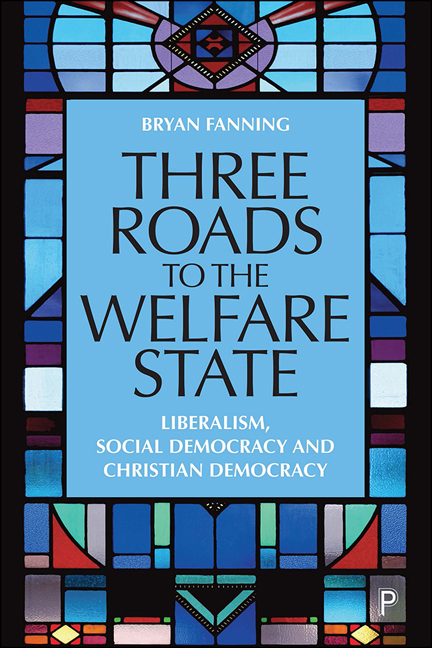Book contents
- Frontmatter
- Contents
- About the author
- Preface
- 1 Three roads
- 2 The invention of laissez faire
- 3 Utopian socialism
- 4 Reform liberalism and technocracy
- 5 Catholic social thought versus modernity
- 6 The case for social democracy
- 7 Social engineering versus democracy
- 8 The rise of neoliberalism
- 9 European Christian democracy
- 10 Legacies
- Notes
- Select bibliography
- Index
5 - Catholic social thought versus modernity
Published online by Cambridge University Press: 13 May 2022
- Frontmatter
- Contents
- About the author
- Preface
- 1 Three roads
- 2 The invention of laissez faire
- 3 Utopian socialism
- 4 Reform liberalism and technocracy
- 5 Catholic social thought versus modernity
- 6 The case for social democracy
- 7 Social engineering versus democracy
- 8 The rise of neoliberalism
- 9 European Christian democracy
- 10 Legacies
- Notes
- Select bibliography
- Index
Summary
During the nineteenth century, the Catholic Church became increasingly exercised by the influence of the Enlightenment, as this found expression in politics and social policy through both liberalism and socialism. By the end of the century, the Church had managed to put forward a hugely influential third way alternative to these which influenced the development of both authoritarian corporatism and Christian democracy. The 1891 papal encyclical Rerum Novarum (trans. ‘Of New Things’ but sometimes given the title ‘On the Condition of the Working Classes’) was no less than the totemic Catholic equivalent of Adam Smith's The Wealth of Nations or of Karl Marx and Friedrich Engels’ The Communist Manifesto. Intellectually, this drew on Thomism – Aristotelian natural law philosophy as Christianised by Thomas Aquinas – for its rebuttals of liberalism and socialism. Neo-Thomism provided the basis for specific political and social prescriptions that were at once an expression of interest group politics and presented an ideological alternative to secular modernity. Rerum Novarum acknowledged a spirit of revolutionary change in politics and economics and recognised the ‘misery and wretchedness pressing so unjustly on the working classes.’
Yet it harked back to a time before the Enlightenment when liberalism and individualism did not exist. It idealised the pre-capitalist Middle Ages as the golden age of Christianity in Europe.
The focus of this chapter is on efforts to promote European Catholic third way alternatives to liberalism and socialism in the aftermath of Rerum Novarum and on the political contexts in which Catholic thought proposed utopian responses to secular modernity, which drew on both the Romantic Right, with its belief in ‘natural’ communities that needed to be protected from modernity, and a sense of Christian universalism – of being part of a Christian community. Whether what was proposed was a specific institutional system, such as the corporatist state, or whether opposition to secular modernity found expression as an idealisation of medievalism, the goal was one of religious restoration. Some of the focus of this chapter is on authoritarian expressions of utopian Catholic conservativism. Yet, the underlying critiques of capitalism and modernity that fuelled these had a wider cultural and political impact. At times these overlapped with those of liberal and socialist reformers.
- Type
- Chapter
- Information
- Three Roads to the Welfare StateLiberalism, Social Democracy and Christian Democracy, pp. 77 - 98Publisher: Bristol University PressPrint publication year: 2021



